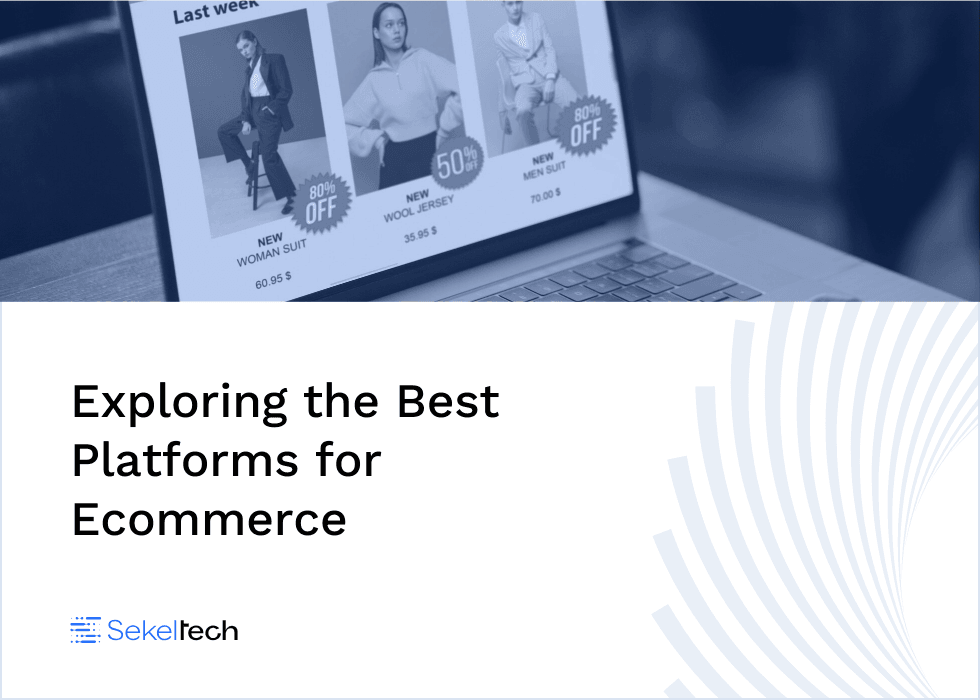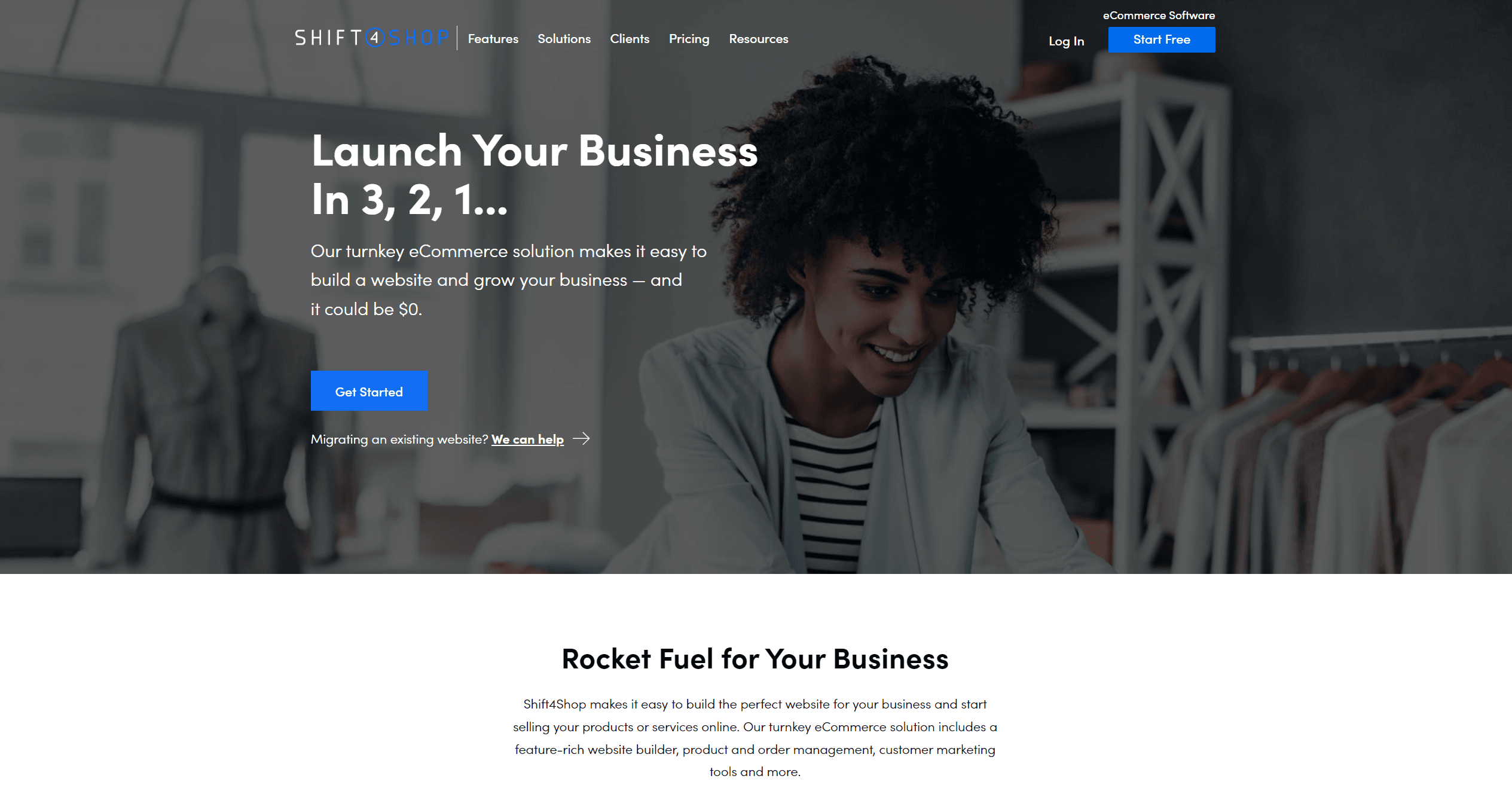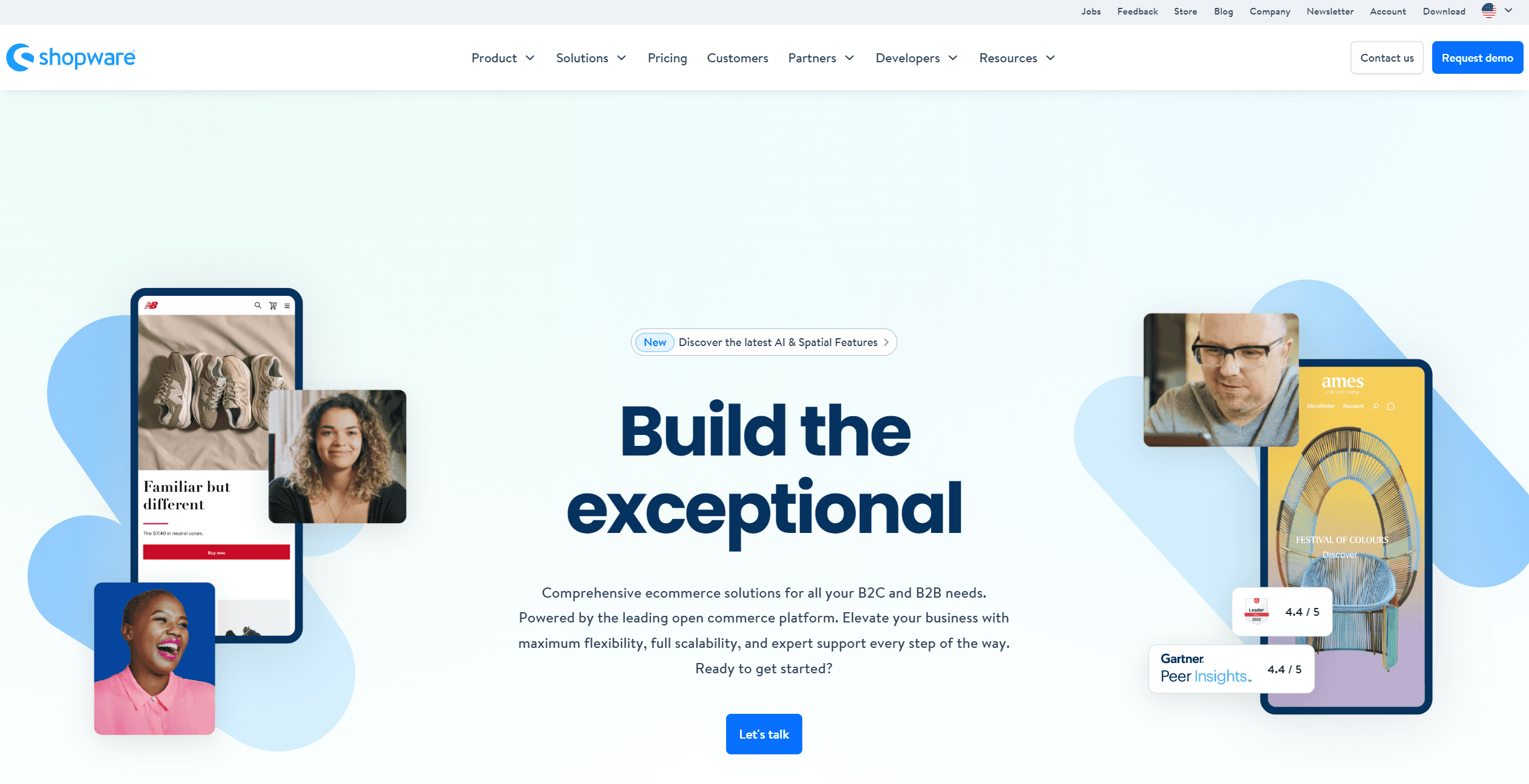Ecommerce
Exploring the Best Platforms for Ecommerce in 2025
Tue, 17 Sep 2024 09:20:17 GMT
Speak to our Hyperlocal Expert

The best platform for ecommerce offers a seamless blend of scalability, customization, and user-friendly features. It should support diverse payment options, mobile responsiveness, strong security, and robust customer support, ensuring a smooth shopping experience.
In today’s fast-paced digital world, ecommerce is no longer just an option—it's a necessity. With more consumers shopping online than ever, businesses of all sizes need to establish a strong online presence to stay competitive. The choice of an ecommerce platform can make or break that presence, impacting everything from site performance to customer experience.
As we move into 2024, selecting the best platform for ecommerce has become even more critical. The right platform supports seamless transactions and scalability and provides the tools needed to attract, engage, and retain customers in an increasingly crowded marketplace.
In this article, we will explore the best ecommerce platforms for businesses in 2024, analysing their features, strengths, and ideal use cases to help you make an informed decision for your online store.
What is an Ecommerce Platform?
An ecommerce platform is the backbone of an online store, providing businesses with the tools and features needed to sell products and services over the Internet. It includes functionalities like product management, payment processing, order fulfilment, and customer service. The best platform for ecommerce will offer ease of use, flexibility for customization, scalability to grow with your business, robust SEO capabilities, seamless payment integration, and reliable customer support. These elements are crucial for optimising sales, improving user experience, and ensuring the long-term success of an online business.
Key Features and Criteria for the Best Platform for Ecommerce
1. Ease of Use
A user-friendly interface simplifies setting up and managing an online store, even for non-technical users.
2. Customization Options
Flexibility to tailor the website’s appearance and functionality to match the brand’s identity, including customizable templates and plugins.
3. Scalability
Capability to grow with the business, accommodating increased traffic, expanding product catalogues, and additional features.
4. SEO Capabilities
Tools for optimising the site for search engines, including customizable URLs, meta tags, sitemaps, and mobile responsiveness.
5. Payment Integration
Support for multiple payment gateways to ensure a smooth and secure checkout experience for customers.
6. Security
Advanced measures like SSL certificates, PCI compliance, data encryption, and regular updates to protect against fraud and data breaches.
7. Mobile Compatibility
Responsive design for an optimal shopping experience on all devices, is particularly important as mobile commerce grows.
8. Analytics and Reporting
Built-in tools to track performance metrics, customer behaviour, and inventory, aiding in data-driven decision-making.
9. Customer Support
Reliable support options, including live chat, email, phone support, and comprehensive documentation.
10. Third-Party Integrations
Compatibility with other software and tools, such as email marketing platforms and CRM systems, for streamlined operations.
Understanding the challenges of digital leads and sales is key to selecting the best platform for ecommerce. Explore the biggest challenges dealers and distributors face and how to overcome them.
15 Best Platforms for Ecommerce
#1 Best Platform for Ecommerce - Sekel Tech

Sekel Tech offers a comprehensive hyperlocal discovery and omni-commerce platform designed to drive local engagement and sales growth. It features a unified solution for managing consumer journeys, capturing data, and generating demand with tools for targeted campaigns. The platform includes Store2Door features, which streamline the order fulfilment process by integrating local delivery options, enhancing customer convenience, and improving operational efficiency. Additionally, Sekel Tech provides a seamless integration of CRM, CDP, DMS, and ePoS systems to ensure all dealer, product, and lead data is effortlessly captured and managed.
#2 Best Platform for Ecommerce - Shopify

Shopify is one of the most popular eCommerce platforms due to its user-friendly interface and extensive customization options. It provides a range of templates, apps, and integrations to help businesses set up online stores quickly and manage sales, inventory, and marketing effectively.
#3 Best Platform for Ecommerce - BigCommerce

BigCommerce is known for its scalability and robust features suited for growing businesses. It offers advanced SEO tools, multi-channel selling capabilities, and customizable templates. BigCommerce supports a wide range of integrations and has built-in features for international selling.
#4 Best Platform for Ecommerce - Wix eCommerce

Wix eCommerce allows users to create and manage online stores with a drag-and-drop website builder. It offers a variety of templates and design options, as well as features for inventory management, payment processing, and marketing.
#5 Best Platform for Ecommerce - WooCommerce

WooCommerce is a WordPress plugin that turns any WordPress site into a fully functional eCommerce store. It is highly customizable, with a wide range of plugins and themes available. WooCommerce is ideal for businesses already using WordPress and looking for flexibility.
#6 Best Platform for Ecommerce - Square Online

Square Online integrates seamlessly with Square’s payment processing system, offering an easy way to set up an online store. It provides features like inventory management, order fulfilment, and built-in marketing tools, making it suitable for small to medium-sized businesses.
#7 Best Platform for Ecommerce - Squarespace

Squarespace is known for its beautifully designed templates and intuitive website builder. It includes eCommerce features such as product management, inventory tracking, and payment processing. Squarespace is ideal for businesses focused on design and branding.
#8 Best Platform for Ecommerce - Salesforce Commerce Cloud

Salesforce Commerce Cloud is a powerful enterprise-level platform that provides a comprehensive suite of tools for managing online stores. It offers advanced features for personalised shopping experiences, AI-driven recommendations, and multi-channel retailing.
#9 Best Platform for Ecommerce - Adobe Commerce Cloud

Adobe Commerce Cloud (formerly Magento) offers a flexible and scalable eCommerce solution with extensive customization options. It includes features for managing complex catalogues, customer segmentation, and advanced analytics. It is suitable for businesses with advanced needs.
#10 Best Platform for Ecommerce - Shift4Shop

Shift4Shop provides a range of eCommerce features with a focus on ease of use and integration with payment solutions. It offers tools for store management, marketing, and SEO, making it a versatile option for various business sizes.
#11 Best Platform for Ecommerce - OpenCart

OpenCart is an open-source eCommerce solution that provides a user-friendly interface and extensive customization options. It supports multiple languages and currencies, making it suitable for businesses looking for a cost-effective, scalable solution.
#12 Best Platform for Ecommerce - Volusion

Volusion offers a range of eCommerce tools for store management, including inventory tracking, product management, and SEO features. It is known for its ease of use and customer support, catering to small and medium-sized businesses.
#13 Best Platform for Ecommerce - Big Cartel

Big Cartel is designed for small businesses and independent artists. It provides an easy-to-use platform with simple store management tools, customizable themes, and basic marketing features. It is ideal for those looking for a straightforward solution without advanced features.
#14 Best Platform for Ecommerce - Shopware

Shopware is a robust eCommerce platform that caters to both small and large businesses. It offers extensive customization options, multi-channel selling capabilities, and advanced analytics. Shopware is known for its flexibility and scalability.
#15 Best Platform for Ecommerce - Weebly

Weebly, now part of Square, provides a drag-and-drop website builder with integrated eCommerce features. It is ideal for users who want to create an online store quickly with minimal technical knowledge, offering tools for product management, payment processing, and marketing.
Discover what sets Sekel Tech apart in the world of ecommerce platforms. Watch this video to learn more about its unique approach to hyperlocal marketing and how it helps businesses thrive.
Key Trends in Ecommerce Platforms for 2024
The ecommerce landscape is rapidly evolving, and platforms must adapt to keep up with the changing needs of businesses and consumers. Here are some of the key trends shaping the best platforms for ecommerce in 2024:
1. AI Integration
Artificial Intelligence (AI) is revolutionising ecommerce by enhancing personalization, optimising product recommendations, and automating customer support with AI-driven chatbots. Platforms that incorporate AI tools provide more personalised shopping experiences, improving customer engagement and conversion rates.
2. Mobile-First Design
With a significant increase in mobile commerce, platforms are prioritising mobile-first designs. Ecommerce platforms must ensure fast load times, intuitive navigation, and seamless checkout experiences on mobile devices to meet the demands of today’s consumers, who often shop on the go.
3. Multi-Channel Selling
Selling across multiple channels—such as social media, online marketplaces, and brick-and-mortar stores—is becoming essential. Leading platforms now offer robust integrations that allow businesses to manage inventory, orders, and customer interactions from a single dashboard, enhancing efficiency and reach.
4. Sustainability
Consumers are increasingly conscious of sustainability, and ecommerce platforms are responding by providing tools that support eco-friendly practices. Features like carbon-neutral shipping options, digital receipts, and sustainable product tagging help businesses align with these values and appeal to a more environmentally conscious audience.
5. Headless Commerce
The shift towards headless commerce, where the front-end and back-end of the platform are decoupled, is gaining traction. This trend allows for greater flexibility and customization, enabling businesses to deliver unique shopping experiences tailored to different customer touchpoints.
6. Enhanced Security Features
With cyber threats on the rise, hyperlocal ecommerce platforms are focusing on advanced security measures, such as two-factor authentication, end-to-end encryption, and secure payment gateways, to protect customer data and build trust.
7. Subscription-Based Models
Platforms are increasingly offering features that support subscription-based models, providing businesses with a consistent revenue stream. These include tools for managing recurring payments, automatic renewals, and customer retention strategies.
How These Trends Influence the Best Platform for Ecommerce in 2024:
Platforms that embrace these trends are positioned to offer more competitive, innovative, and customer-centric solutions. AI integration and mobile-first design enhance user experience, while multi-channel selling capabilities allow businesses to maximise their reach. A focus on sustainability and security aligns with consumer expectations, and headless commerce provides the flexibility needed for customised shopping experiences. As a result, the best platforms for ecommerce in 2024 will be those that adapt to these trends, providing tools and features that cater to evolving business and consumer needs.
Choosing the right eCommerce platform is crucial for your online store's success. The Economic Times provides an in-depth guide on selecting the best eCommerce platform, considering factors such as scalability, ease of use, customization options, and pricing. Read more here.
Frequently Asked Questions (FAQs)
1. Which platform is best for an ecommerce store?
a. Sekel Tech is a top choice for ecommerce due to its comprehensive hyperlocal discovery and omni-commerce features, which drive local engagement and optimise sales growth.
b. Shopify is renowned for its user-friendly interface and extensive customization options, making it ideal for various business needs.
c. BigCommerce excels in scalability and advanced features, suitable for growing businesses seeking multi-channel selling.
d. WooCommerce integrates seamlessly with WordPress, offering flexibility and a wide range of customization options for those already using WordPress.
e. Salesforce Commerce Cloud provides enterprise-level tools with advanced personalization and AI-driven recommendations for a sophisticated ecommerce experience.
2. What is the best ad platform for ecommerce?
Google Ads and Facebook Ads are highly effective for ecommerce due to their extensive targeting options and ability to drive high-quality traffic. These platforms offer tools to optimise ad campaigns and measure performance for better ROI.
3. What are the 4 types of ecommerce?
The four types of ecommerce are Business-to-Consumer (B2C), Business-to-Business (B2B), Consumer-to-Consumer (C2C), and Consumer-to-Business (C2B). Each type represents different interactions and transactions between businesses and consumers.
4. What does D2C mean?
D2C, or Direct-to-Consumer, refers to a business model where manufacturers sell products directly to consumers, bypassing traditional retail intermediaries. This approach allows for greater control over brand experience and customer relationships.
5. What are the 5 P's of ecommerce?
The 5 P's of ecommerce are Product, Price, Place, Promotion, and People. These elements are crucial for developing an effective ecommerce strategy, covering what is sold, pricing strategies, distribution channels, marketing efforts, and customer interactions.
Conclusion
Selecting the best platform for ecommerce in 2024 is pivotal for driving online success and staying competitive in a rapidly evolving digital landscape. The right platform will not only streamline your operations but also enhance customer experiences, optimise sales, and support business growth. As you evaluate your options, consider the key trends shaping ecommerce, such as AI integration, mobile-first design, and multi-channel selling. These innovations will influence your choice and help you build a robust, future-ready online store. By selecting a platform that aligns with your strategic goals and customer expectations, you'll be well-positioned to thrive in the competitive ecommerce landscape of 2024.
Take Advantage of Sekel Tech's Hyperlocal Discovery & Omni-Commerce Platform
Unlock unparalleled growth for your business with Sekel Tech’s Hyperlocal Discovery & Omni-Commerce Platform. Sekel Tech stands out by offering a comprehensive solution designed to enhance your local engagement and drive significant sales growth. The platform excels in connecting brands with local customers through seamless integration of CRM, CDP, DMS, and ePoS systems, ensuring efficient data management and optimised customer interactions.
Sekel Tech’s platform provides advanced tools for targeted hyperlocal campaigns, boosting your visibility in local searches and generating high-quality leads. Its Store2Door features streamline the order fulfilment process, integrating local delivery options to enhance customer convenience and operational efficiency. By leveraging data-driven insights, Sekel Tech empowers businesses to make informed decisions and effectively manage their consumer journeys from discovery to delivery.
Embrace the future of retail with Sekel Tech and transform your approach to local and omni-channel marketing. Explore how Sekel Tech can elevate your business and help you achieve remarkable success in the competitive ecommerce landscape.
Read Also -
1. Hyperlocal Ecommerce: Advantages & Platforms in 2024
2. Ecommerce Platform for B2B & B2C: Detailed Guide for 2024
3. Boost Your Sales: Top 15 Omni Channel Commerce Platforms
4. Best All-in-One Platform for Hyperlocal Discovery & Omni-Commerce
Share
Similar Blogs
Loved this content?
Sign up for our newsletter and get the latest tips & updates directly in your inbox.
There’s more where that came from!